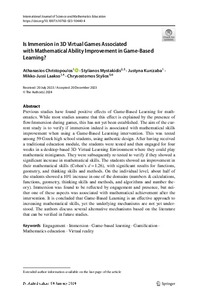Is Immersion in 3D Virtual Games Associated with Mathematical Ability Improvement in Game-Based Learning?
Christopoulos Athanasios; Mystakidis Stylianos; Kurczaba Justyna; Laakso Mikko-Jussi; Stylios Chrysostomos
Is Immersion in 3D Virtual Games Associated with Mathematical Ability Improvement in Game-Based Learning?
Christopoulos Athanasios
Mystakidis Stylianos
Kurczaba Justyna
Laakso Mikko-Jussi
Stylios Chrysostomos
SPRINGER
Julkaisun pysyvä osoite on:
https://urn.fi/URN:NBN:fi-fe2025082787773
https://urn.fi/URN:NBN:fi-fe2025082787773
Tiivistelmä
Previous studies have found positive effects of Game-Based Learning for mathematics. While most studies assume that this effect is explained by the presence of flow/immersion during games, this has not yet been established. The aim of the current study is to verify if immersion indeed is associated with mathematical skills improvement when using a Game-Based Learning intervention. This was tested among 59 Greek high school students, using authentic design. After having received a traditional education module, the students were tested and then engaged for four weeks in a desktop-based 3D Virtual Learning Environment where they could play mathematic minigames. They were subsequently re-tested to verify if they showed a significant increase in mathematical skills. The students showed an improvement in their mathematical skills (Cohen's d = 1.26), with significant results for functions, geometry, and thinking skills and methods. On the individual level, about half of the students showed a 10% increase in one of the domains (numbers & calculations, functions, geometry, thinking skills and methods, and algorithms and number theory). Immersion was found to be reflected by engagement and presence, but neither one of these aspects was associated with mathematical achievement after the intervention. It is concluded that Game-Based Learning is an effective approach to increasing mathematical skills, yet the underlying mechanisms are not yet understood. The authors discuss several alternative mechanisms based on the literature that can be verified in future studies.
Kokoelmat
- Rinnakkaistallenteet [27094]
